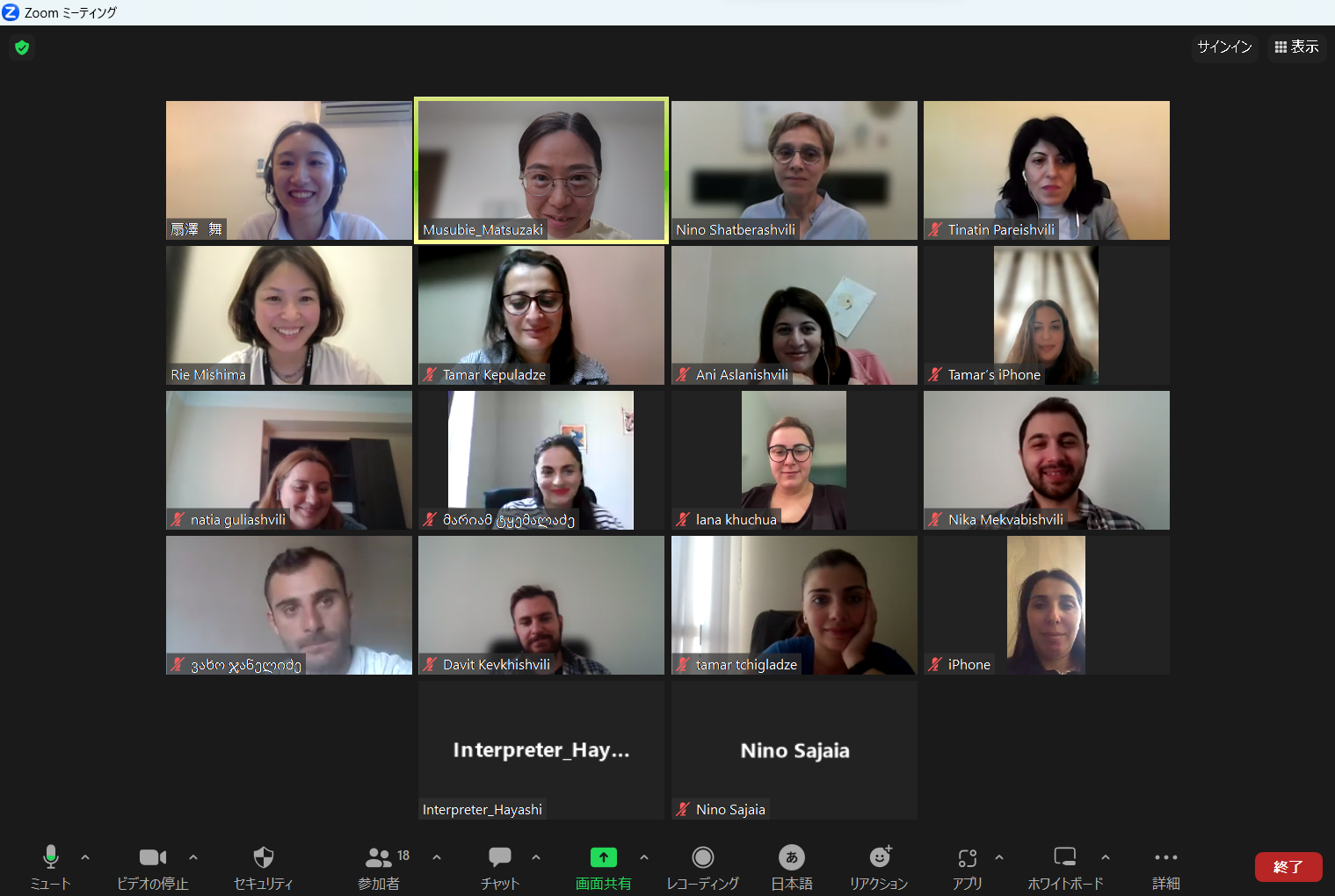認定NPO法人
全国こども食堂支援センター・むすびえ
【開催報告】ジョージア教育省のソーシャルワーカー向けセミナー / [Report] Seminar for Social Workers from the Georgia Department of Education

むすびえは、2023年9月20日(水)にジョージア教育省のソーシャルワーカーとそのスーパーバイザーの皆さんに、日本のこども食堂を紹介するセミナーを実施しました。
日本でも伝統料理のシュクメルリが話題になったジョージア。コーカサス山脈の南、アジアとヨーロッパの間に位置する人口370万人の国です。
ジョージアでは、学校給食がなかったり、大人も仕事していてランチを食べないこともよくあるそうです。日本とは食事に対する意識が大きく異なります。
「გამარჯობა(ガマルジョバ)!」 (2025年1月29日更新)
ジョージア語で「こんにちは」と呼びかけて始まりました。
最初に理事の三島より、日本のこども食堂やむすびえの取り組みについて紹介しました。
参加者からは、「子どもにとって、食べることはとても大事。こども食堂は(人と人とが)つながれる場所でもあり、重要だと思う」といった感想が聞かれました。
こちらから「ジョージアにはこども食堂のようなものはある?」「コミュニティビルディングの取り組みはある?」と聞いたところ、「こども食堂はないが、食料配布がある」「教会で活動している場合もあるが、コミュニティビルディングといえるかどうか…」と日本のこども食堂をとても新鮮に感じていただいたようでした。
「求められるスキルは?」という質問も出ました。こども食堂は市民が自発的に行っている取り組みで、学校や保育園のように特別な資格が必要とされるわけではないことを伝えると、やや不思議そうな表情にー。社会的、文化的な違いがあることを改めて感じる機会にもなりました。
むすびえは、こども食堂が、孤独・孤立、子どもの貧困、地域のつながりの希薄化など様々な社会課題の解決につながるものととらえ、同様の課題をかかえる他の国とも連携していけたらと考えています。これからも日本のこども食堂の取り組みを、海外に向けて発信していきたいと思います。
[Report] A seminar was held for social workers from the Georgia Department of Education.
On Wednesday, September 20th, 2023, Musubie held a seminar to introduce Japanese children’s cafeterias to social workers and their supervisors from the Georgia Department of Education.
A traditional dish from Georgia called Shkmerli has become widely known, even in Japan. Georgia is a country of 3.7 million people located south of the Caucasus Mountains, between Asia and Europe. In Georgia, they do not have school lunches and even many workers often fail to eat lunch during work. The attitude towards meals is very different from Japan.
“გამარჯობა (Gamarjoba)!” (Updated on January 29, 2025)
It started with saying “Hello” in Georgian.
Then, Rie Mishima, executive managing director in Musubie, introduced the efforts of Japanese childrens cafateria “Kodomo Shokudo” and Musubie.
One participant said, “Eating is very important for children.I think the children’s cafeteria is important because it is a place not only for eating but also where people can be connected.”’
When we asked, “Is there something like a children’s cafeteria in Georgia?” and “Are there any community building initiatives?”. Georgian participants said, “We don’t have a children’s cafeteria, but there is food distribution” and “We are active at church. There could be some cases like children’s cafeterias in Japan, but I don’t know if they can be called community building initiatives…” she said, giving a very fresh impression of Japanese children’s cafeterias.
An additional comment from the participants was “What kind of skills are required for children’s cafeterias in Japan?”. When Mishima explained that the children’s cafeteria is a voluntary initiative run by citizens and does not require any specific skills such as licenses for teaching at schools or kindergartens, there were some puzzled expressions among the participants. This seminar was also an opportunity for us to realize once again that there are social and cultural differences.
Musubie believes that children’s cafeterias can help solve various social issues such as loneliness and isolation, child poverty, and the weakening of community ties, and hopes to collaborate with other countries that face similar issues. We would like to continue to introduce the efforts of Japanese children’s cafeterias to other countries.






